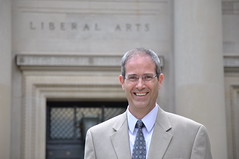There can be little doubt that we are living through a time of great transformation in higher education. New forms of digital communication have opened new possibilities for education even as they have disrupted and caused us to reconsider traditional modes of pedagogy and scholarship. The liberal arts finds itself repeatedly required to justify its worth and legitimacy in a digital age.
During my tenure as Associate Dean for Undergraduate Studies, we have tried to respond to this situation by putting these new modes of digital communication into practice by demonstrating how the liberal arts is a specific and valuable way of engaging the world we inhabit.
To this end, we have sought to build an online community around the virtues of a liberal arts education by emphasizing habits of engagement that can enrich our online lives and in person relationships: the ability to communicate effectively, an openness to and appreciation for diversity, a sensitivity to the ethical implications of our decisions, and a commitment to respond to complexity with nuance and a sense for the wider whole to which we belong. These abilities are cultivated by a liberal arts education rooted in the virtues of generosity, worldliness, and ethical imagination.
In taking on new responsibilities this July as Associate Dean for Graduate and Undergraduate Education, I hope to extend this online digital community to the graduate level.
On the undergraduate level, we created the Liberal Arts Voices podcast and the LAUS Blog to highlight the transformative educational experiences our students have; we built the Career Enrichment Network to help them navigate a successful path from college to the world of work; and we created the Office of Digital Media, Pedagogy and Scholarship to facilitate the effective use of technology in academic research and teaching.
Extending this to the graduate level will involve specific challenges, as our graduate students are more reticent – for understandable reasons – to engage in scholarly communication in the digital public sphere. Nevertheless, over the next few months, the Office of Digital Media, Pedagogy and Scholarship will begin to reach out to our graduate students in the humanities and social sciences to encourage them to more actively craft an online identity that will expose their academic work to a wider public and position them effectively for a successful job search.


Congratulations, Dr. Long, it has been a great journey earning a diploma under your leadership. Now that graduation is over, and after reading the above, I have a question. It’s certainly true that the Internet has disrupted not only the Liberal Art’s but also many if not every academic discipline available. Personally, I never thought that I’d graduate with a Political Science degree, since my passion has always been geared towards technology and finance. Now that I am done, I am looking into numerous graduate programs that may help me get back on track towards my quest for knowledge and understanding. Yet, in the midst of such disruptive technology such as the Internet, and my affinity for finance and technology, what would you recommend someone like me should do? I have work experience, yet the economy was slow, and I was working in the finance industry in San Jose as a fundraiser for a private placement platform that me and some others’ had created. Now, I want to continue my education, and I would be grateful for some mentoring or anything that may lead me in the right direction. You being through this, and your statement above which is in sync with my current ideology of what’s to come, I was wondering if you had any advice for me in regards to continuing my education? For example, if I were you and you were me, what kind of educational goal would you suggest as a next step?
Thanks Dr. Long
Most Humbly
Your Student
Beau Griffis